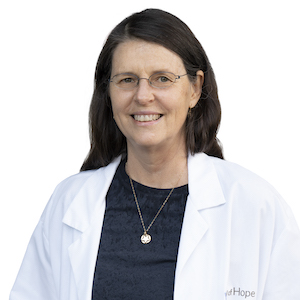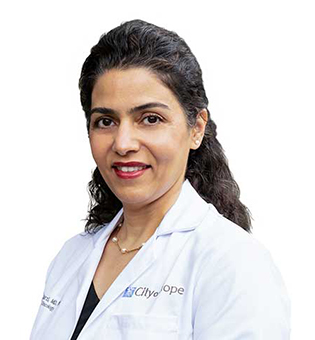Andreas Kaiser, M.D., professor and chief of the Division of Colorectal Surgery, Department of Surgery, reviewed the scans of the anxious young woman sitting in his office. When he told her, “Your cancer is curable,” she grabbed his hands and collapsed in tears.
Kaiser’s office is the site of many conversations with patients and their families, both joyous and difficult. But what he never expected was to be having such talks with patients who are so young.
Colorectal cancer, the disease that claimed the life of "Black Panther" actor Chadwick Boseman at age 43 (he was diagnosed at 39), was once considered an “old person’s” illness. It no longer is.

“I’m seeing an alarming number of young patients,” said Kaiser. He admits this may be partly due to “referral bias” — the toughest cases get sent to City of Hope. Nevertheless, “on some clinic days, I only see young people. I’ve treated five young mothers diagnosed during pregnancy with metastatic disease. The old demographic of 50-, 60-, 70-year-olds? I just don’t see it.” Kaiser says he has even treated colorectal cancer patients in their teens.
What Kaiser sees in his clinic is borne out by national numbers. While overall cancer rates are declining and colorectal cancer among older adults has dropped steadily since its peak in 1985, so-called “early-onset” colorectal cancer — affecting younger people — is on the rise. In 2002, the average age for a colorectal cancer diagnosis was 72. By 2019, it was down to 66. That’s because new cases in people under 55 doubled, from 11% to 20%. The National Cancer Institute says early-onset colorectal cancer is now the No. 1 cause of cancer death in people 20 to 49 years old.
It gets worse. Studies show that cancer that develops in younger people tends to be more aggressive.
So what happened? Why are Gen Xers, millennials and Gen Zers developing a disease they never would have dreamed of getting not that long ago?
Possible Causes for Colorectal Cancer’s Rising Rate
Nobody can point to one single factor responsible for this disturbing trend. But there are plenty of theories out there. They range from our genes to our diets, our weight and lack of exercise to pollutants in our air, soil and water.
If there is one condition that raises more red flags than others, it is obesity. Being overweight — frequently accompanied by chronic inflammation, insulin resistance and diabetes — appears to be part of a “perfect storm” that makes colorectal cancer more likely. And the under-50 generation came of age when the American diet radically changed, resulting in an obesity epidemic.
“Colorectal cancer is a disease of obesity,” declared Victoria L. Seewaldt, M.D., professor and chair of the Department of Population Sciences, adding, “Young patients came up in the age of fast food.”

“Nutrition and calories used to be coupled,” continued Seewaldt, the Ruth Ziegler Chair in Population Sciences. “But now we have high-calorie foods with little nutritional content. That’s what our younger generations are eating.” Add to this a sedentary lifestyle, and you have millions of people consuming excess calories that don’t get absorbed by muscle but rather are stored as fat. This leads to insulin resistance, causing the body to overproduce insulin, “a powerful hormone that drives every pathway that makes cancer more aggressive.”
A 2017 study published in the Annals of Oncology made it clear: Some of the very foods and habits that lead to obesity also point to colorectal cancer risk: “High intake of red and processed meat and alcohol increase the risk of colorectal cancer.” The same study shows a corresponding decrease in colorectal cancer correlated with a healthy diet of fruits, vegetables and whole grains.
Again, the numbers bear it out:
“Patients with a body mass index greater than 30 have double the risk of colorectal cancer,” said gastrointestinal cancer specialist Afsaneh Barzi, M.D., Ph.D, associate professor in the Department of Medical Oncology & Therapeutics Research. “This trend began in the 1990s, and it has become more pronounced.”
Environmental Factors and Colorectal Cancer
What else changed during that period, besides people getting heavier? Barzi points to environmental factors that may have altered our “microbiome,” or gut bacteria. She cites a January 2024 study published by the American Association for Cancer Research suggesting that “many of the lifestyle factors that promote colorectal cancer can also affect the gut microbiome, which may be associated with colorectal cancer risks.” In addition, this association is age-dependent, meaning “microbe interactions with tumor pathways are stronger in young versus older colorectal cancer” patients.

Barzi is especially concerned about a chemical called triclosan, introduced in the late 1960s as an anti-bacterial agent in household products like soap and toothpaste. Some studies have linked triclosan to increased cancer risk, but the data is inconclusive. Still, in 2016 the Food and Drug Administration banned the substance for household use, although it’s still around in commercial pesticides.
Other things we ingest may also be harming us. A June 2023 study by the National Institutes of Health looked at so-called “microplastics” — tiny particles that leech out of plastic products such as water bottles and food containers — finding their way into our food and water and from there into our bodies. The increase in such microplastic infestation roughly tracks the rise of colorectal cancer among young people.
It might even come down to where you live.
“Look at San Francisco,” said Yuman Fong, M.D., Sangiacomo Family Chair in Surgical Oncology. “All those new urban spaces created in shipyards, dumping areas, places once filled with asbestos, oil, toxic spills. All that pollution in the ground and air. People don’t think about all that when they move to those places.” Or, they might not even know.
Seewaldt notes that in some ways, colorectal cancer can now be considered a “disease of poverty,” pointing to its prevalence in the most socioeconomically disadvantaged areas, which often have the highest levels of pollution and are sometimes called “food deserts” for their lack of access to healthy meal choices. “The highest rates of colorectal cancer are found along the lower Mississippi River in Arkansas, Tennessee and Mississippi, where you have heavily contaminated areas, high levels of obesity and poverty, and not enough doctors," she said.
Lack of Colorectal Cancer Symptom Awareness
Finally, lapses in judgment — on both sides of the examination table — may also be a factor. It is believed that many young people delay seeing a doctor when they experience bleeding or any kind of digestive distress. It never occurs to them that they may be experiencing the early symptoms of colorectal cancer. As for the doctors treating them, too many are still dismissive of a young person’s tummy troubles.
“Young people think they’re invincible, so they don’t go to the doctor, and that delays diagnosis,” said Fong. “Worse, nobody believes them when they have troubles.”
“Young people are brushed off,” agreed Kaiser, “They’re told they have hemorrhoids or something. And when diagnosis is delayed, that’s the ultimate tragedy.”

A small number of early-onset colorectal cancer cases may have a genetic component. People who inherit various syndromes, such as familial polyposis — which produces hundreds of polyps in the colon — may be at greater risk. Lynch syndrome has been known to produce tumors on the right side of the colon. There is also the BRAF mutation, a spontaneous change that tells cells to keep multiplying with no instructions to stop. This mutation is present in 10% of colorectal cancer patients.
But there is no overwhelming genetic “smoking gun,” such as the BRCA mutations that create a high risk for breast cancer.
“In most young people with colon cancer, we don’t find something genetic — no history in the family,” Fong said. “So is it something hidden that we just haven’t found yet?”
When the cause is murky, prevention is challenging. Yet just about everyone agrees that changing personal behavior can make a big difference.
“Each of us has the power to change our fate,” said Barzi. “That means changing what we eat: healthier foods, less processed food. And we need to create an environment that encourages physical activity. This is under our direct control.”
And when something feels wrong, pay attention.
“Don’t downplay your symptoms,” warns Kaiser. “If you have rectal bleeding, for example, don’t assume it’s nothing. Get it checked!” He also wants to educate more doctors about early-onset colorectal cancer so they don’t routinely dismiss young patients’ complaints.
The gold standard for “getting it checked” is colonoscopy. Unfortunately, under current guidelines, this procedure is not recommended for people under 45 with average risk, and insurance companies won’t pay for it. Many would like to see that policy change, with more practitioners trained to administer colonoscopies to more people. There is also research underway to develop more noninvasive tests.
The ultimate “silver lining” message here, however, is that Stage 4 colorectal cancer, even the aggressive type commonly found in young patients, no longer carries the grim prognosis it once did.
With today’s advanced treatment options, “We have many young patients who are now cancer free,” said Fong.
Main image: Milton Liu was diagnosed with inoperable Stage 4 colon cancer in his 40s before coming to City of Hope for a second opinion. He credits Yuman Fong, M.D., with saving his life.
